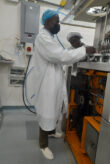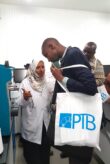A Ghanaian-German development cooperation success story
Pesticides may only be registered and marketed if they are not harmful to human health, do not contaminate groundwater and have no negative impact on the environment. In Ghana, due to limited logistics and human resources at relevant governmental institutions, there is insufficient testing of the quality of pesticides being imported into or produced in the country as well as inadequate surveillance of pesticides on the market.
In a joint study by German and Ghanaian institutions, the quality of selected pesticides used by mango farmers in Ghana was analyzed. The study revealed that the majority (73%) of the tested products did not comply with the national requirements and with international tolerance ranges defined by the Food and Agriculture Organization of the United Nations and the World Health Organization.
‘This study was an eye-opener. Most of the tested products did not comply. We need to intensify pesticide post-market surveillance activities in Ghana.’ Mr. Joseph C. Edmund, Deputy Director EPA Ghana
To address this pressing issue, an exchange programme between the relevant Ghanaian and German institutions has been established. In 2019, three Ghanaian experts from the Ghanaian Environmental Protection Agency and the Plant Protection and Regulatory Services Directorate visited Germany for two weeks to work with experts responsible for the registration, testing, compliance monitoring and field surveillance of pesticides. After returning home, the Ghanaian experts developed a work plan to incorporate the lessons they learned into their local systems. In addition, Ghana is setting up a new laboratory for pesticide sample analysis at the Port of Tema.
Next steps
This fruitful cooperation between Ghanaian and German institutions will continue in the future. In addition to peer learning and technical exchange, the necessary equipment for pesticide analysis is being procured and a detailed market surveillance programme is being developed and implemented by the Ghanaian authorities.
Due to the potentially devastating impact of pesticides on human health and the environment, capacity development to improve registration, quality control procedures, use and storage and continuous market surveillance of pesticides remains a priority.
The Ghanaian-German development cooperation includes the Ghanaian Environmental Protection Agency (EPA), the Plant Protection and Regulatory Services Directorate (PPRSD), the Ghana Standards Authority (GSA), the Physikalisch-Technische Bundesanstalt (Germany’s national metrology institute, short PTB) and the German Federal Office of Consumer Protection and Food Safety (BVL).
Image © PTB








